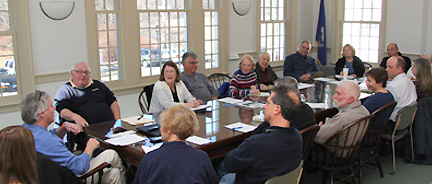 Policy & Planning
Policy & Planning
Policy and Planning Overview
In order to support community climate adaptation planning and policy through research and analysis, CIRCA seeks to better understand the challenges facing the state and its communities. The Institute examines various methodologies to understand better how towns can manage diverse policy goals, funding challenges, alternative approaches to adaptation, and implementation problems in pursuit of effective climate adaptation.
Policy & Planning for Extreme Weather and Climate Change
In the aftermath of storms and as the climate changes, communities are faced with decisions about how to build back and plan for the future. There are both regulatory mandates that they must face, i.e. floodplain building regulations, planning and zoning ordinances, flood insurance, and coastal zone management as well as voluntary planning activities, such as coastal resilience plans. Once a community identifies potential actions, options for paying for these actions must also be identified and balanced against other pressing needs of the community. The federal government has embraced resilience as part of its recovery programs to aid communities in their efforts to “build back better” as noted in the Hurricane Sandy Rebuilding Strategy. The strategy includes using innovative design and green infrastructure approaches.
CIRCA and Policy & Planning
With the federal government’s commitment to resilience planning also came funds for those planning efforts through recovery grants such as FEMA Hazard Mitigation Planning and the HUD Community Development Block Grant Disaster Recovery program. Across the state, Connecticut’s municipalities are using these funds to plan for the future and adapt their infrastructure. CIRCA’s work in this area includes the development of decision support tools that can be used by communities to better incorporate future projections of sea level rise and flooding into their plans and infrastructure decisions. CIRCA engages in policy analysis and the development of model policy options for municipalities such as planning and zoning ordinances and financing tools. The Institute has partnered with the State on multiple governance and planning efforts. CIRCA is a member of the Long-Term Recovery Committee, State Agencies Fostering Resilience, and the Governor’s Council on Climate Change. CIRCA staff led the development of the State’s application for the HUD National Disaster Resilience Competition, including providing a regional vulnerability assessment and resilience concept.
Overview of Projects
The attached list of projects includes all Policy and Planning projects UCONN CIRCA has participated in or funded.
References
Connecticut Climate Preparedness Plan
The Connecticut Climate Preparedness Plan evaluated the projected impacts of climate change on the state’s agriculture, infrastructure, natural resources, and public health. The plan also includes recommendations for adaptation, research, and education.
Connecticut Natural Hazard Mitigation Plan
The Connecticut Natural Hazard Mitigation Plan represents the state’s efforts to approach mitigating the effects of natural disasters. This plan is used as a guideline for the implementation of effective mitigation of natural hazards, natural hazard identification, and risk assessment.
U.S. Department of Housing and Urban Development. “Hurricane Sandy Rebuilding Strategy: Stronger Communities, A Resilient Region.” Hurricane Sandy Rebuilding Task Force. Washington, DC 2013.
Climate Change in Long Island Sound
Climate Change in Long Island Sound: A Long Island Sound Resource Guide, provides information on key climate change concepts, resources, and Long Island Sound indicators; a portal for links community case studies; examples of research and monitoring being conducted in Long Island Sound; and an educator’s toolbox for teaching about the impacts of the climate system on the Sound. The website also features a news feed and links to other climate resources.
The Resilience and Adaptation in New England (RAINE) Database
The RAINE database offers a collection of vulnerability, resilience and adaptation reports and plans and webpages at the state, regional, and community level. RAINE provides quick maps to view organizations being tracked in RAINE, graphs, links to products or plans, and reports for each state, municipality, organization or water body of interest.
The Adaptation Clearinghouse seeks to assist policymakers, resource managers, academics, and others who are working to help communities adapt to climate change. Content focal areas include the water, coastal, transportation, infrastructure and public health sectors, and adaptation planning, policies, laws, and governance. Resources that fall within these areas receive priority and are the most likely to be published in the Adaptation Clearinghouse. The Adaptation Clearinghouse is sponsored by the Georgetown Climate Center.
U.S. Climate Resilience Toolkit
Using plain language, the U.S. Climate Resilience Toolkit helps people face climate problems and find climate opportunities. The site offers a five-step resilience planning process, real-world case studies, a catalog of available tools, a visualization tool for the impacts of climate change, narratives describing climate change impacts across the nation, training course, maps for finding climate information, and a search engine for climate science from the federal government.

Featured Website
Resilient Connecticut
CIRCA, in coordination with state agencies, regional councils of governments (COGs) and municipalities, has initiated Resilient Connecticut, as part of Phase II of the HUD National Disaster Resilience Competition. Resilient Connecticut will provide the state with a regional and watershed focused Climate Adaptation Planning Framework piloted in the Superstorm Sandy impacted regions of New Haven and Fairfield Counties.
